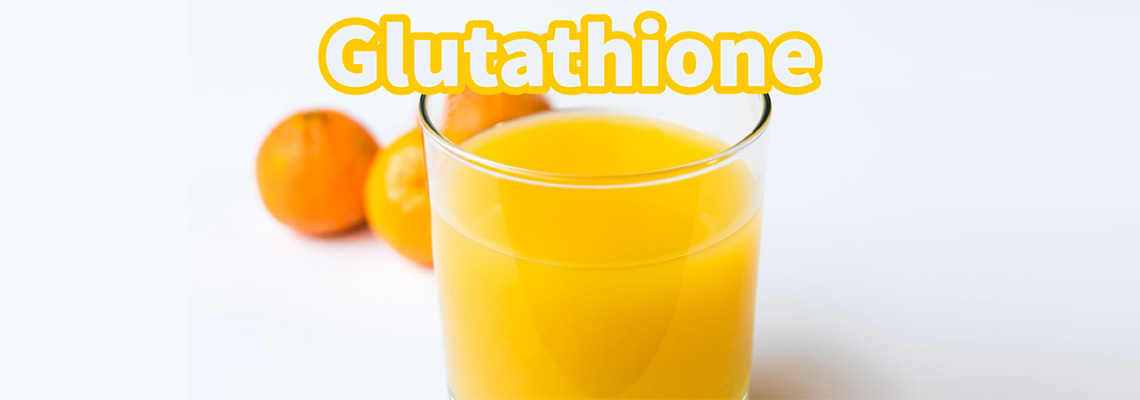06
2023
Glutathione: Why is it so essential for health & beauty?

Glutathione is one of the most potent and vital antioxidants produced in the human body. Antioxidants, as we know, are compounds found in food which inhibit or stop oxidation, a chemical process which produces free radicals.
Antioxidants protect our cells against free radicals, which are molecules produced when our body breaks down food or when we are exposed to radiation or tobacco smoke and can cause damage to our cells leading to heart disease and cancer among others.
While most antioxidants are found in food, glutathione is the only one found naturally in the body. It is primarily made up of three amino acids, glycine, cysteine, and glutamic acid.
It is produced by the liver and plays a vital role in many body processes like tissue building and repair, making chemicals and proteins needed in the body, and in immune system function. This makes it an important antioxidant that impacts both our health and outward beauty factors: skin, hair, and that healthy glow.
As we age, our body’s ability to produce glutathione slows down and the solution then is to consume foods rich in it as it is important to maintain adequate levels of this antioxidant in the body.
Besides ageing, levels of this antioxidant in the body can also be depleted due to factors like a poor diet and a sedentary lifestyle. But that can be rectified by increasing our physical activity, getting enough sleep, eating a balanced diet and avoiding too much alcohol. Supplements can also help. Milk thistle, turmeric extracts and whey protein supplements can help boost glutathione.
Diseases like cancer, AIDS, type 2 diabetes, hepatitis and Parkinson’s can also cause levels of this antioxidant to fall.
How to boost your glutathione levels naturally
Eat foods rich in sulfur - Sulfur is needed for the synthesis of glutathione. It is found in amino acids like methionine and cysteine. It is mainly found in beef, fish and poultry. There are also vegetarian sources of sulfur which are found in cruciferous vegetables like broccoli, Brussels sprouts, cauliflower, kale, watercress and mustard greens. Onions, shallots and garlic are also good sources.
Increase Vitamin C intake - According to research, an increased intake of Vitamin C leads to an increase in levels of glutathione in the body. Citrus fruits like oranges, lemons, kiwis, strawberries, papaya, bell peppers and potatoes are good sources. The vitamin C we consume not only acts as an antioxidant but also helps maintain the body’s supply of other antioxidants like glutathione.
Add foods rich in selenium to diet - Selenium is a mineral which is essential for glutathione activity. So by increasing our intake of selenium, we can help maintain or even increase the level of glutathione in the body. The best sources of selenium include beef, chicken, fish, organ meat, cottage cheese, beans, sunflower seeds, mushrooms, brown rice and Brazilian nuts.
Eat foods rich in glutathione - Even though the human body produces glutathione, it is also naturally found in food like spinach, avocados, asparagus and okra. Though the body is unable to properly absorb glutathione from food, it still helps in dealing with oxidative stress.
Milk Thistle & Turmeric - Milk Thistle supplements extracted from the milk thistle plant is useful in boosting glutathione levels. Curcumin, which is found in turmeric is also known to have the same impact.
Chickpeas, lentils and walnuts - Contain cysteine which is an important amino acid needed to produce glutathione. So consumption of whey protein may help boost glutathione levels.
Cruciferous Vegetables - These vegetables are the main sources of dietary sulfur. Including: Cauliflower, broccoli, cabbage, arugula, kale, and radish. They provide sulfur in the form of contain glucosinolates.
Allium Vegetables - Another source of dietary fiber. These group of vegetables are rich in sulfur: including sulphides, sulfoxides, vinyldthiins and thiosulfates. The are: garlic, onions, leeks, green onions and shallots.
Exercise regularly - Staying active physically is high on the list of ‘must dos’ for a healthy body and mind. We all know the benefits of exercise. Exercise is also known to help in maintaining and boosting antioxidant levels in the body, specially that of glutathione. Cardio and weight training are especially helpful. But overdoing it without proper nutrition and rest may actually have an adverse impact on the levels of the antioxidant.
A good night’s sleep is a must - One can never over emphasize the importance of a good night’s sleep. Restful sleep is absolutely essential for our health, both physical and mental. Lack of adequate sleep over a period of time can lead to hormonal imbalances as well as decrease glutathione levels. Getting enough sleep regularly actually helps to boost the levels of this antioxidant.
While all the above will go a long way in maintaining and even boosting the body’s level of this essential antioxidant naturally, there are certain other factors like we mentioned, which cannot be overlooked.
Avoid excessive alcohol and smoking - Alcoholism has many adverse effects on the human body like brain damage, liver cirrhosis and pancreatitis among others. Lung damage is also caused by excessive drinking of alcohol and of course smoking. The lungs require glutathione to function properly but excessive drinking can cause the depletion of glutathione in the lungs by almost 80-90 per cent. In fact, not just our lungs, alcoholism causes glutathione levels all over the body to drop.
